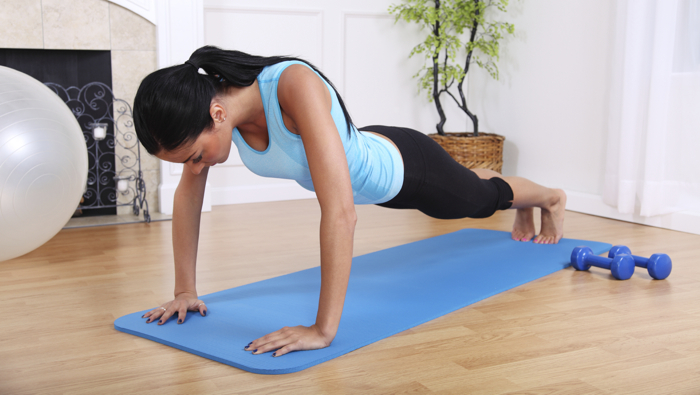Follow a healthy diet and exercise regularly to stay healthy during coronavirus lockdowns
10/08/2020 / By Zoey Sky

The extended Wuhan coronavirus (COVID-19) lockdowns have changed the routines of regular Americans. Many now sleep in and wake up in the afternoon instead of waking up early and preparing to go to work, thanks to the remote work setups and lockdowns meant to slow the spread of the disease.
This change in routine, however, negatively affects people’s health. Doctors warn that their patients are struggling to maintain healthy habits amid the pandemic. They state that with the coronavirus still at large, proper diet and regular exercise are now more important than ever while the country faces this health crisis.
Coronavirus has led to unhealthier lifestyles
Experts are worried about the unhealthy behaviors people are developing because of all the time they spend at home due to measures meant to slow the disease. These behaviors, such as being inactive and consuming too much junk food, have even led to pandemic-related terms like “COVID curves” and the “quarantine 15,” both referring to the pounds gained while spending more time indoors.
Dr. David Kilgore, director of the integrative medicine program at the University of California, Irvine, explained that a lot of people are finding it hard to maintain their overall health, keep their immune systems healthy and avoid unhealthy temptations, especially when they’re also worried about the pandemic. (Related: 10 Tips to boost your immunity the natural way.)
Data from the Centers for Disease Control and Prevention has shown that even before the pandemic began, over 40 percent of American adults were obese. That said, even health-conscious individuals are also struggling to refrain from any bad habits they’ve developed because of the pandemic.

Karen Clark, who discovered competitive rowing later in life, used to be able to work out several times a week. The pandemic, however, changed her routine. The 62-year old is now unable to meet up with her teammates to row. She also stopped exercising at the YMCA.
Suddenly cooped up at home because of the pandemic, Clark now spends more time sitting at her desk or just being sedentary throughout the day. Like others in her situation, Clark’s days now involve a lot of junk food eaten while watching movies or TV shows.
Worried about the 12 pounds she gained during the lockdowns, Clark started cutting out chips, ice cream and other treats. She’s also started using the rowing machine in her basement.
How to establish healthy workout routines
Dr. W. Scott Butsch, director of obesity medicine at the Cleveland Clinic’s Bariatric and Metabolic Institute, suggests starting some basic daily workout routines if you’ve been more sedentary because of the pandemic. Butsch recommends that you “bookend” your day with physical activity. Try taking a short walk in the morning, then jog after work.
If you have kids who are going to be stuck at home while studying remotely this fall, prepare meals in the morning. Alternatively, you can prep several meals at the beginning of the week.
Dr. Leticia Polanco, a family medicine doctor with the South Bay Primary Medical Group, said that it’s best to take things slow if you haven’t exercised in a while. As you get used to your exercise routine, try more rigorous activities to get your heart rate up. Go for a walk or ride a bike.
If you want to work out at home, follow the tips below:
- Focus on bodyweight movements. Make your workout routine more intense by incorporating bodyweight exercises like burpees, lunges, planks, pushups and squats. Choose several movements then create a circuit workout by completing as many reps of that one movement as possible in one minute. Rest for one minute, then continue to the next movement and do the same thing. Repeat this cycle for 15 to 20 minutes.
- Watch online workout videos or download fitness apps. Search for free workout videos. Once you find one you like, try it out and look for more similar videos.
- Buy affordable fitness equipment online. You don’t have to break the bank for new fitness equipment. Items like jump ropes, suspension trainers, or resistance bands are inexpensive and you can work out a sweat using your new workout gear.
- Use items around your house. If you don’t want to spend on new workout gear, be creative. Use a sturdy chair for triceps dips or use large cans of soup or a gallon of water for dumbbells.
- Make workouts fun by listening to your favorite songs. Dance along to your playlist or use a hula-hoop.
- Make exercise a family activity. Exercising can be boring, but it can be a fun activity if your loved ones join you. Take your dog for a walk daily. If you have kids, exercising with them helps burn off their extra energy. Organize a backyard obstacle course during the weekend to entertain bored kids, or play soccer in your backyard.
If you prefer group workouts, try joining virtual fitness groups. They’re not the same as regular gym fitness classes, but they help you stay motivated if you’re stuck at home alone.
Use technology to your advantage and join live-streamed video workouts with fellow health enthusiasts. Another option is to find gyms offering live digital fitness classes and physical training sessions.
Avoid junk food and eat more fresh produce
Once you’ve settled into a regular exercise routine, make healthy changes to your diet. Avoid fatty and sugary snacks to lower your risk of chronic diseases such as diabetes, hypertension and obesity, all of which are coronavirus risk factors.
Kim Guess, a dietitian at the University of California, Berkeley, suggests stocking up on superfoods like beans and lentils, canned fish (e.g., salmon and tuna), fresh and frozen vegetables, nuts, seeds, tempeh, tofu and whole grains.
If you’re not a whiz in the kitchen, try a simple recipe for a vegetable side dish. As you get used to cooking for yourself, start learning other healthy recipes.
Not sure where to start? Follow these tips to improve your eating habits:
- Avoid eating candies and chocolates. You should also limit your intake of sugary drinks like sweetened tea and coffee, fruit juices and soda.
- Eat fresh fruit instead of cakes and cookies.
- If you want savory snacks, try carrot and zucchini sticks with some hummus or a handful of unsalted almonds or walnuts.
- Eat whole-grain foods such as unprocessed maize, millet, oats, wheat and brown rice. These superfoods are full of fiber that promotes digestive health. Dietary fiber also makes you feel full longer.
- Eat a mix of whole grains like wheat, maize and rice; fresh fruit and vegetables; legumes like beans and lentils and protein like eggs, lean meat, or fish.
Don’t neglect your overall health because you’re stuck at home during the pandemic.
Butsch concluded that exercising and following a healthy diet is important because you’re fighting a “virus which doesn’t have a treatment.” Keeping your immune system healthy is key to protecting yourself from coronavirus.
Visit Prevention.news for more articles on how to boost your overall well-being.
Sources include:
Submit a correction >>
Tagged Under:
#nutrition, coronavirus, covid-19, disease treatments, exercise, food is medicine, functional food, immune system, physical activity, prevention, proper diet, regular exercise
This article may contain statements that reflect the opinion of the author





















